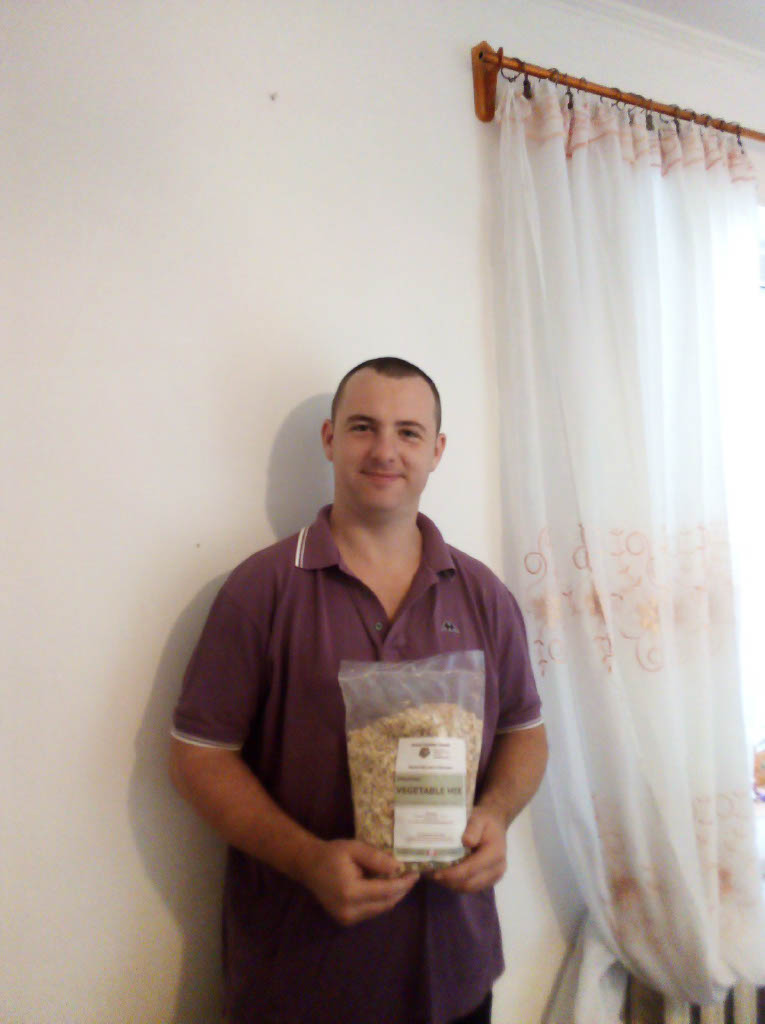
Since March 2022, Global Aid Network (GAiN) has provided disaster relief to people in Ukraine that have been internally displaced, directly affected in-country, or have fled to neighbouring countries because of the ongoing war. In partnership with our offices in Germany and the Netherlands, GAiN has helped ship over 215 truckloads of essential items to refugees within Ukraine, as well as Poland, Hungary, Romania, Latvia and the Republic of Moldova.
Over the course of our involvement in Ukraine, we have received many incredible testimonies of God’s faithfulness in meeting the needs of the people and demonstrating His unconditional love for them.
In one report, we learned about a young family who fled from occupied Melitopol in early March 2022. Nikolai Yushchiki (38 years old) and his wife Galina (36 years old), together with their children, fourteen-year-old Stas and two-year-old Alisa, found refuge in western Ukraine in the village of Ivanichi. Before the war, Nikolai worked at a foundry, and Galina worked at a confectionary shop. As a result of Russian aggression, the family was left without a means of supporting themselves.
Now, they receive only social benefits as Internally Displaced Persons (IDPs).The family was able to rent a small apartment in Ivanichi, but soon realized that the mattresses were in terrible condition. Nikolai turned to a charity foundation for help, asking if it would be possible to get new mattresses. Not only was this request met, but the family also received a grocery box, dry soup, lentils, sugar, as well as dishes and toys for children. Nikolai, Galina and their children were overjoyed, and deeply thankful for the abundance of support. This provision has given them a sense of security and hope for the foreseeable future.
In another report we learned about a man named Pavel Nikolaevich Ivanchenko (78 years old), who escaped the war in the Kherson region in the village of Kamyshany. The village is now under Russian occupation, so Pavel will have to spend the winter in the Volyn region of Pavlovka, which is far from his home. His daughter and family fled to Poland, but he could not bring himself to leave his native country and now must live alone. Since this traumatic experience, his blood pressure often rises and a significant part of his pension and social benefits must now go toward buying medicine. So when he received a package of dry soup from GAiN Canada donors, Pavel was overwhelmed with delight and gratitude. Through the simple act of giving away basic provisions, heartbroken and displaced people like Pavel are shown the goodness and warmth of God’s love.
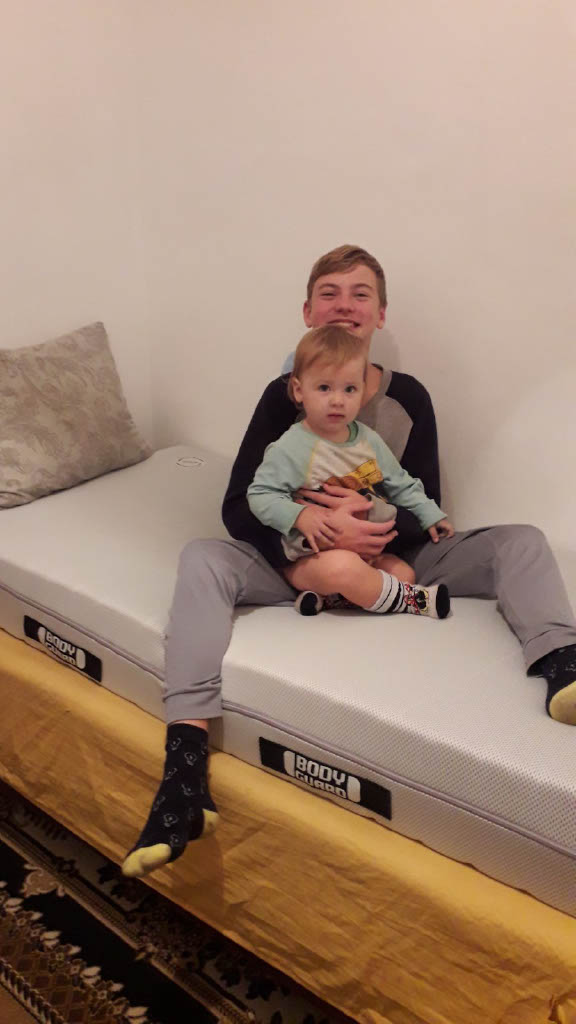
Our team is heartened by the stories of lives being impacted through the practical assistance of our partners on the ground. However, our mission to reveal hope and restore life to those living in crisis and need in Ukraine is far from over. With the winter months upon us, our contacts share a deep concern about Ukrainians weathering the cold season without sufficient heat and electricity.
According to UNHCR High Commissioner, Filippo Grandi, “Winters in Ukraine are very harsh and severe, extremely cold. So, we must do everything possible to prevent the cold of winter from becoming the next challenge for people that already have to face so much in their lives.”
In response to this situation, GAiN has committed to three new projects in Ukraine that targets people’s basic survival needs, such as heat, shelter and food, while also creating space to share the gospel. The first project is in partnership with GAiN Germany, and provides practical support for IDPs registered in the city of Rivne. Since the start of the war, about 20,000 individuals have registered as Internally Displaced Persons (IDPs) in Rivne, and another 60,000 IDPs are forecasted to arrive. In response to these high numbers, this project focuses on setting up four different warming stations around Rivne.
GAiN has formed partnerships with local churches in the area so that locations will be run by a rotation of different church volunteers. Each warming station consists of a large heated tent for people to gather inside and receive warm drinks, a hot meal and engage in spiritually uplifting conversation with volunteers. There are also places for people to charge their phones and receive overnight accommodation, as GAiN Germany is setting up 100 beds within the warming stations.
The locations are utilizing a tool called the Light Box which sends out a mobile network, allowing people to get wifi and download the Bible, watch the JESUS film in their own language, and view different resources on such topics as trauma and information on the city. The church volunteers are available to answer questions and engage in further discussion surrounding the JESUS film showings and the downloadable Bible. GAiN is filled with joy that through the warmth and hospitality of these stations, the people of Ukraine are experiencing the comforting presence of God and coming to know his message of grace.
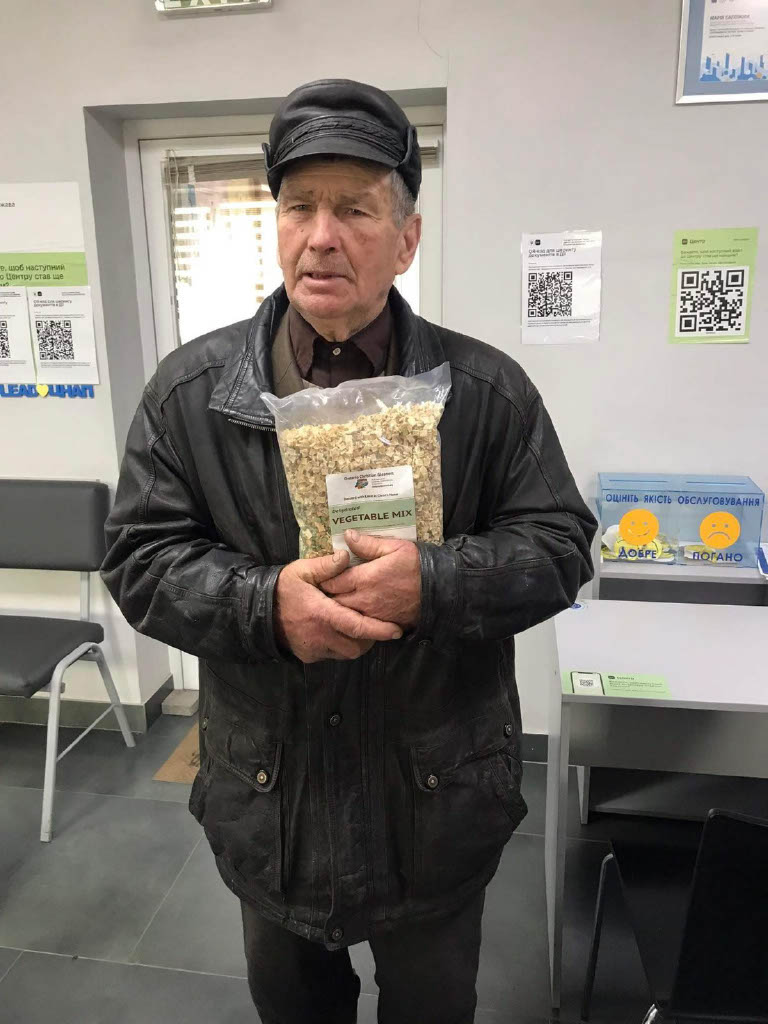
In partnership with another ministry organization, GAiN has launched a second project that focuses on distributing sleeping bags to communities across Ukraine. In early fall, this partner organization bought and distributed twenty sleeping bags, along with goods, such as canned meat, sauces, flour, sugar, salt, oil, and pasta. These sleeping bags were received with immense gratitude, and now as we are in the midst of winter, there is an increasingly high demand for more.
In light of this overwhelming need, we have purchased and distributed at least 250 high-quality sleeping bags to cities and villages in eastern Ukraine. We are thankful for the opportunity to join forces with another ministry, and believe that many will experience the care and love of Jesus Christ through the practical provision of these sleeping bags.
GAiN has undertaken a third project that will take place in the UK and focus on collecting pallets of food, as well as Gifts in Kind (GIK). In partnership with a local organization, GAiN purchased 30 pallets that went into a truck at the end of November, which was then transported into Ukraine in a convoy of 5-6 other semi trucks. Our offices in Germany, Austria and Spain also worked to fill these trucks, and we are thankful for how smooth this process has been.
The cold, long winter only serves to accentuate the devastation and upheaval that already preoccupies Ukraine. Despite the overwhelming need of those that are displaced within the country, GAiN is filled with faith for what the Lord has already accomplished and will continue to accomplish through these projects. We pray that through such gifts as a warm shelter, a hot meal, a sleeping bag or a listening ear, that people would receive a spark of hope and encounter the God that sees and knows them in their distress.
Sources: UNHCR (2022, July 7). Ukraine struggling now, but winter will be even worse: UNHCR chief. https://news.un.org/en/story/2022/07/1122102
Poland provides for Ukrainian refugees –
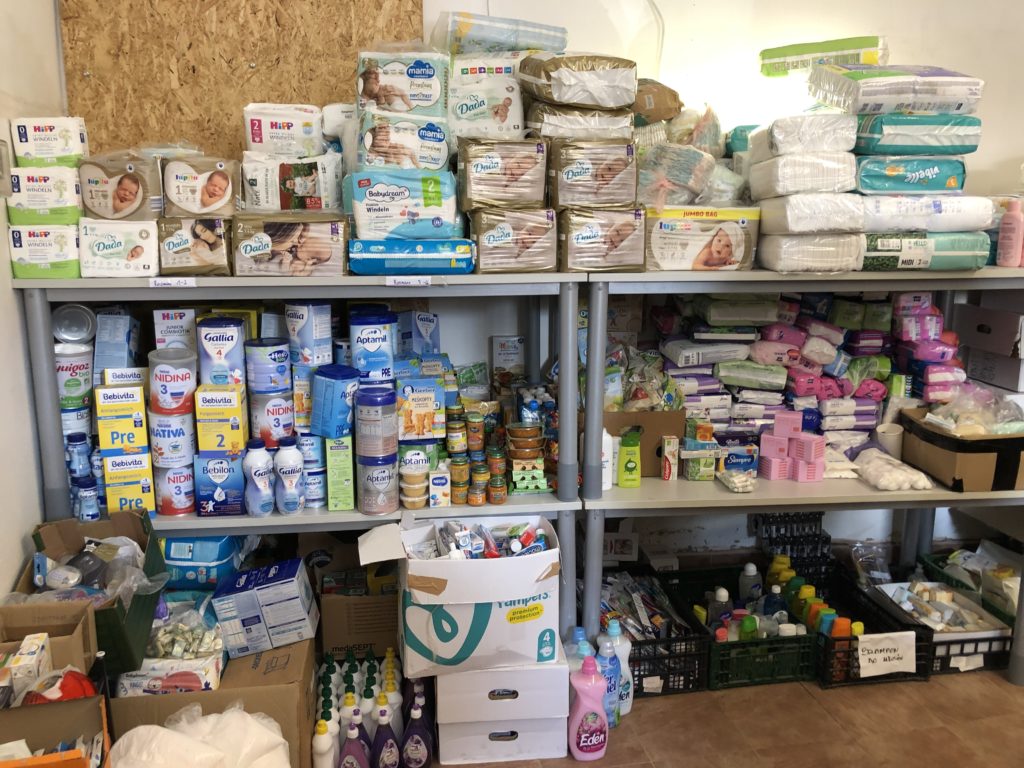
The ongoing war in Ukraine continues to destroy lives. Over 13 million people are displaced –6.6 million people within Ukraine and over 6.4 million refugees in other European countries – with over 17.7 million estimated to be in need of assistance, according to UNHCR.
For Global Aid Network (GAiN), we knew that our worldwide connections would enable us to be ready and equipped to send immediate help to displaced Ukrainians. In partnership with several GAiN offices, including Germany and the Netherlands, we helped ship over 168 truckloads of essential items for refugees in Poland, Hungary, Romania, Latvia and the Republic of Moldova, as well as within Ukraine.
Although news stories from Ukraine continue to be horrifying and disheartening, we have been encouraged by the outpouring of generosity and support for those who have been displaced because of this crisis. Thanks to the prayers and urgent action of our supporters, as well as the efficiency and hard work of our global network, we have been able to obtain emergency relief for refugees and internally displaced individuals and families in a timely manner.
As of October, GAiN has sent 148 shipments from Germany and 67 shipments from the Netherlands. About 20% of the total donated items go to Ukraine, with the rest going to neighbouring countries. These shipments contain food, water, blankets, pillows, diapers, clothes, hygiene items, and many other needed items.
When GAiN Spain staff member Pau A. travelled with Poland partner ESPA Fundacja to deliver essential items for refugees in Poland, they visited a small town outside of the city. He wrote about his time there:
“We drove towards a south-western town named Bielawa on remote bumpy roads, surrounded by hills, green fields and small Polish villages that seemed to appear out of nowhere. It would be easy to think that the Ukrainian war had no effect here. This, of course, would be far from the truth.
While the majority of refugees coming into Poland are headed for the big cities, many refugees are reaching the remote, rural villages and towns in Poland. According to our Polish partners, it is a much harder task for small towns to host and provide for Ukrainian refugees than it is for big cities. Cities are often better prepared in terms of structure and policies, and they receive more support from the government and private institutions.
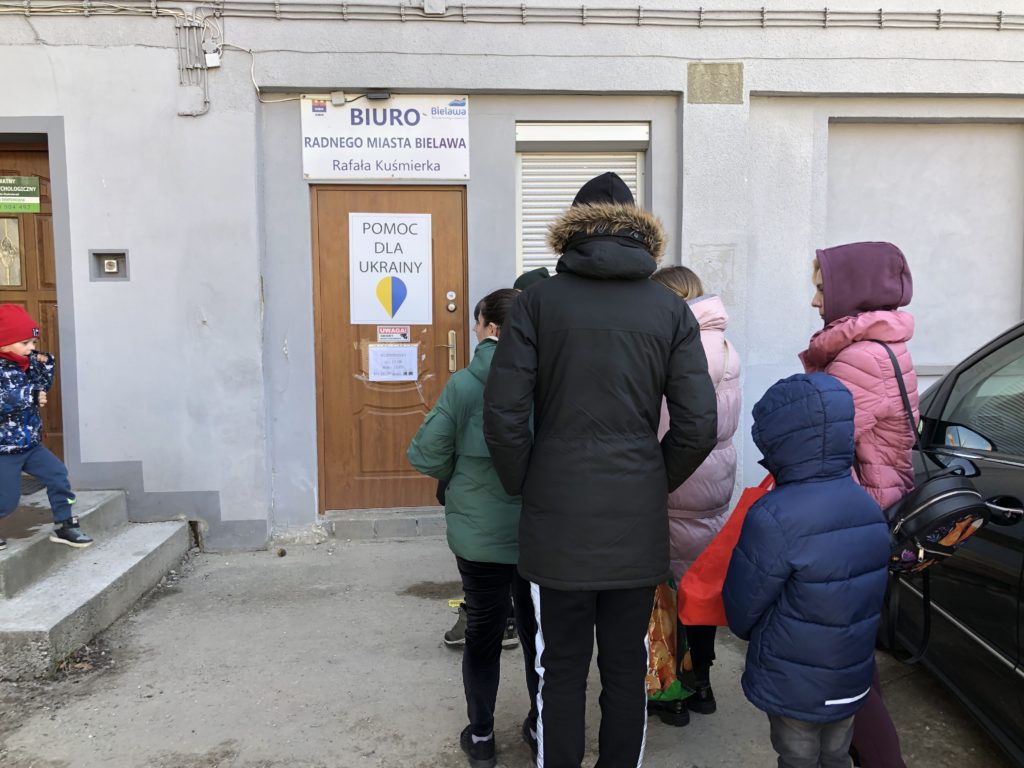
Thankfully, through our growing local partner network of churches and local initiatives, GAiN is supporting Ukrainian families who find themselves in rural villages and small towns in Poland. Here in Bielawa, a town with less than 30,000 inhabitants which is hosting more than a 1,000 refugees, the partnership was already established before the war started.
During our visit to Bielawa, we met a man named Jarek. He is in charge at our partner’s office, which is located next to one of their two rehabilitation centres that host up to 70 people with addiction to alcohol and drugs. Running rehabilitation centres is an important part of the work they do here, yet the Ukrainian refugee crisis is now taking up most of the time of their staff and volunteers.
‘So far, we are helping 300 people – 200 of them children,’ Jarek explained. ‘We use two containers to store, and if there is a need elsewhere, we send it. We also send directly to Ukraine. At the end of this week, we will send our third truck.’ They even receive trucks from Amazon on a weekly basis with goods that are unable to be sold anymore on Amazon, but are still in good condition.
Jarek believes God was preparing them even before there were any rumours of war. For instance, they were finally able to open their social supermarket in November last year. They also unexpectedly received 1,000 mattresses in January that they have been able to use and distribute to refugees. It all started 7 years ago, when they brought in a refugee family from Donbas.
‘They live here in town, and he (he husband)‘ is the one arranging everything,’ Jarek said. ‘He calls to Ukraine, organizes and brings people here. He knows how to deal with this.’
We met Tania, who is about 30 years old, at the storage and distribution building that the city hall provided for Jarek’s foundation when the war started. Her oldest child, eight-year-old Anata, had come with her to gather clothes and hygiene products. Tania explained that she had left her hometown, Tarnopil, with her husband and three children on February 28, but the rest of her family members were still there.
‘We have no plans, we will see later what we will do,’ she said. Her husband is an electrician, while she worked as a hairdresser. It would be easier for them to find jobs here as they had studied the Polish language in Ukraine. Still, their hearts long to return to their home country.
‘Because my mother and father are in Ukraine, brother, grandmother . . . My family could not come.’
So far, the family’s needs are being met. ‘We have everything we need,’ she declared happily. They go to Jarek’s supermarket for food, while at the storage and distribution building, they can find other basic essentials. Some of these products clearly come from GAiN, as shown by the logo on the boxes.
‘We have received so many things from GAiN,’ Jarek said. ‘I lost count. Maybe 10 to 15 vans. Many shoes, and many hygiene and cleaning products.‘ About 180 children have received new high-quality shoes from GAiN.
Adrian, a volunteer, stepped up to say, ‘They have very little, but they have the best shoes in [all of] Poland!’
Jarek also clarified the current and future needs of the refugees. ‘We need food and clothes,’ Jarek stated. ‘The winter is coming to an end, [so] for spring and summer they do not have proper shoes.‘ His daughter Eva, who manages the distribution centre, added that milk and cots are also ongoing needs.
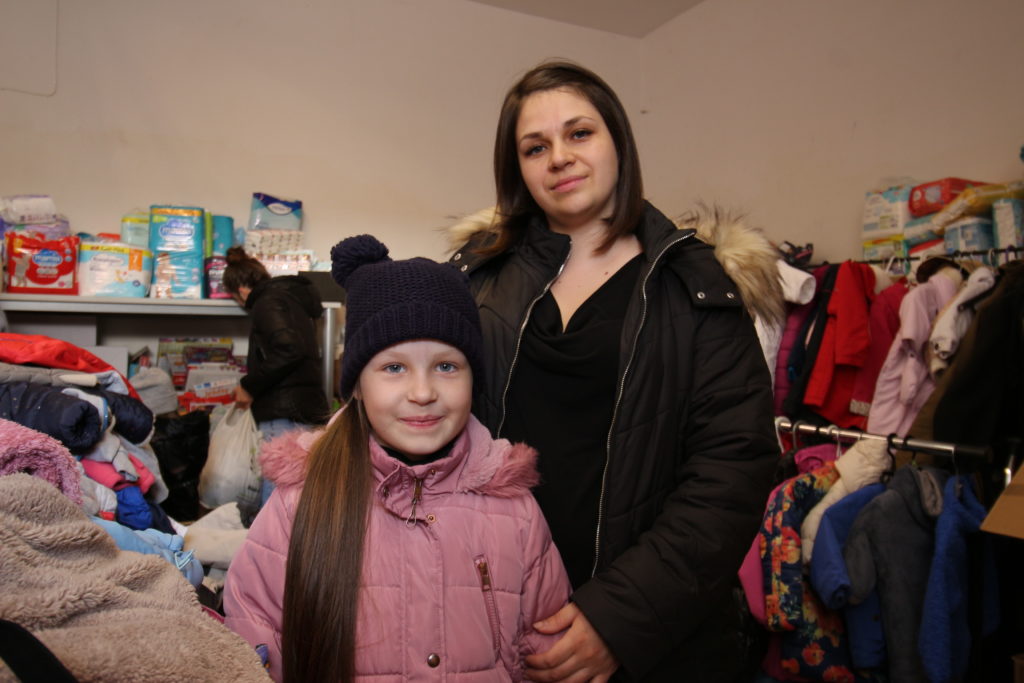
Eva explained that if they don’t receive these items from outside sources, their team works hard to find these basic essentials by coordinating with different organizations, institutions and local authorities. As we talked with her, it was evident that the responsibility of helping the refugees was leading to her physical, mental and emotional exhaustion.
‘There is no rest here,’ she said.
Indeed, there is no time to rest in any of the places in Poland where people are working to host and provide basic needs to Ukrainian refugees. We witnessed this relentless pace at our own warehouse, where trucks were being loaded and unloaded from early morning to late at night. Most of the Polish people behave as though the war was hitting their own country.
As our local partner leader put it once: ‘We Polish only need two things to react like this: one, an enemy, and second, a person, weakened, in need of help.‘” (end of Pau A.’s story)
Lindsey Schacter, COO of GAiN, shares, ‘”As the winter months approach and the war in Ukraine continues, GAiN is committed to supporting individuals and communities affected by the war. Through the generous contributions of partners and our worldwide network, we continue to minister to the holistic needs of those affected and pray for peace to be restored.”
Navigating through the BC Floods
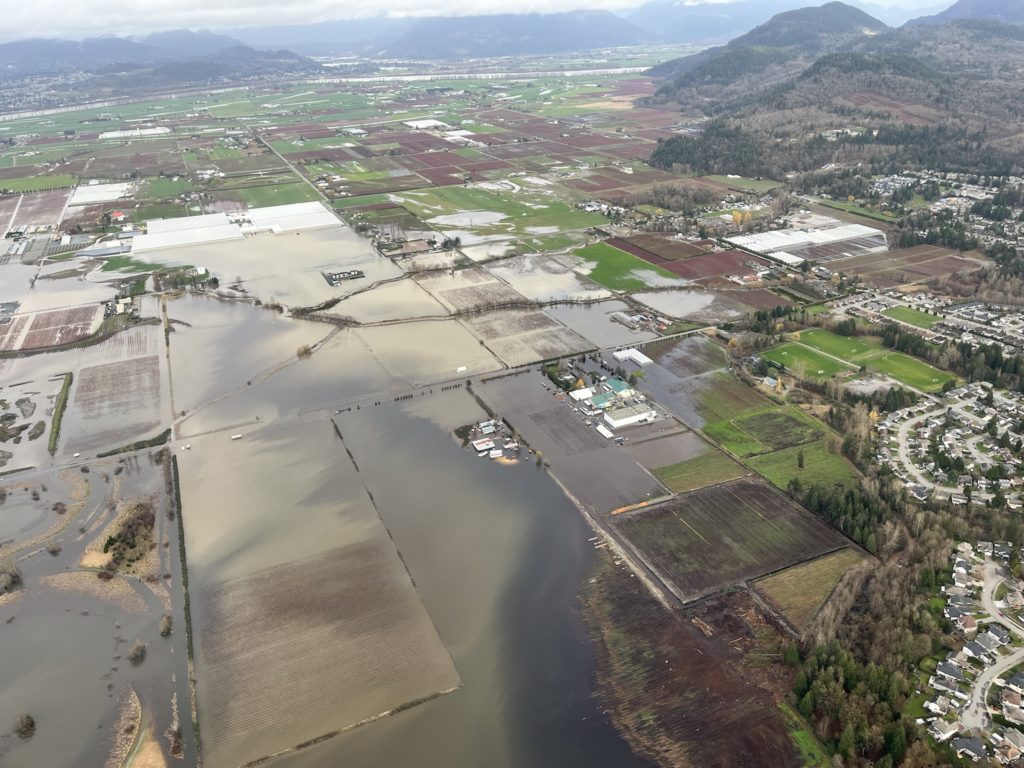
When Dale and Kim took over running a country market in Abbotsford, B.C., they never thought their biggest challenge would be trying to protect their business from raging flood waters.
In November 2021, the B.C. government declared a state of emergency following historic widespread flooding across the province. The impact was devastating, resulting in almost 15,000 people displaced and $450 million in insured damage. Sadly, four people lost their lives and thousands of livestock died.
Dale and Kim found themselves affected by this nightmare and were desperate for help.
“We watched the water approaching,” Kim recalled, adding that the couple had the luxury of seven hours to move as much stock and equipment as possible out of harm’s way. “We shouldn’t have stayed as long as we did. The place was an island (when we finally got out).”
In the end, several of their fridges were flooded, the walls and floor were waterlogged, and the couple’s meat and poultry supplies were ruined.
Thanks to the generosity and urgency of our supporters, Global Aid Network (GAiN) was able to partner with Samaritan’s Purse to send help to those who were affected. This included supporting the evacuee shelter in Abbotsford and equipping volunteers to clean out 200 flooded homes and businesses with special anti-mold spray.
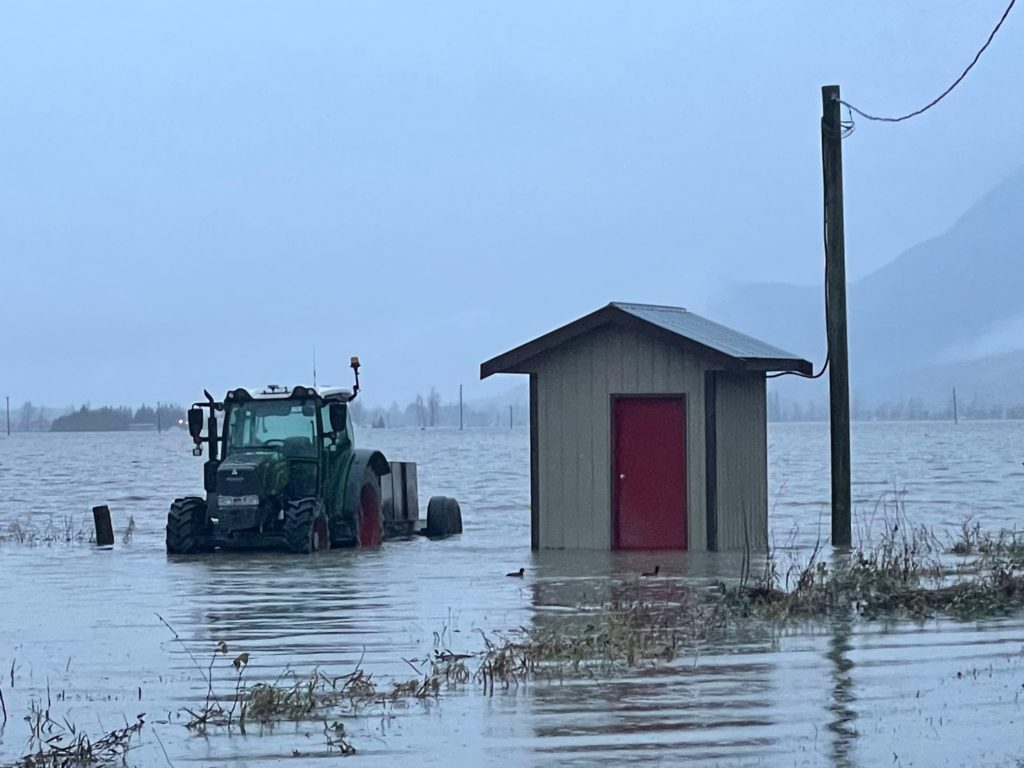
Kim and Dale were two of the hundreds of people who received help. Tractor trailers were equipped to help Kim and Dale, along with many others in Abbotsford and Merritt.
Volunteers that were outfitted in Tyvek safety suits also worked to prepare Dale and Kim’s business for repair by removing waterlogged contents and applying the special spray to prevent mold.
The couple expressed their profound appreciation. “The crew has been so amazing,” Dale said. “They’re leaders without being controlling. It’s such a beautiful thing to watch.”
Kim added: “The volunteers are so amazing, so focused. And when they prayed for us, I just lost it. Thank you so much for giving. I don’t know how we would have gotten through this without [help].”
While this work was being done, God opened doors for Samaritan’s Purse and chaplains from the Billy Graham Evangelistic Association to share the love and hope of Jesus. When each job ended, volunteers gave a special gift of a Bible to homeowners.
Since some of our supporters and staff were affected by the flooding, we were grateful to be in a position to help reveal hope and restore life locally. We are also thankful for those who were able to partner with us to give generously, volunteer their time, and pray faithfully for everyone who was impacted by the situation.
Story by Pau A. (March 11, 2022)
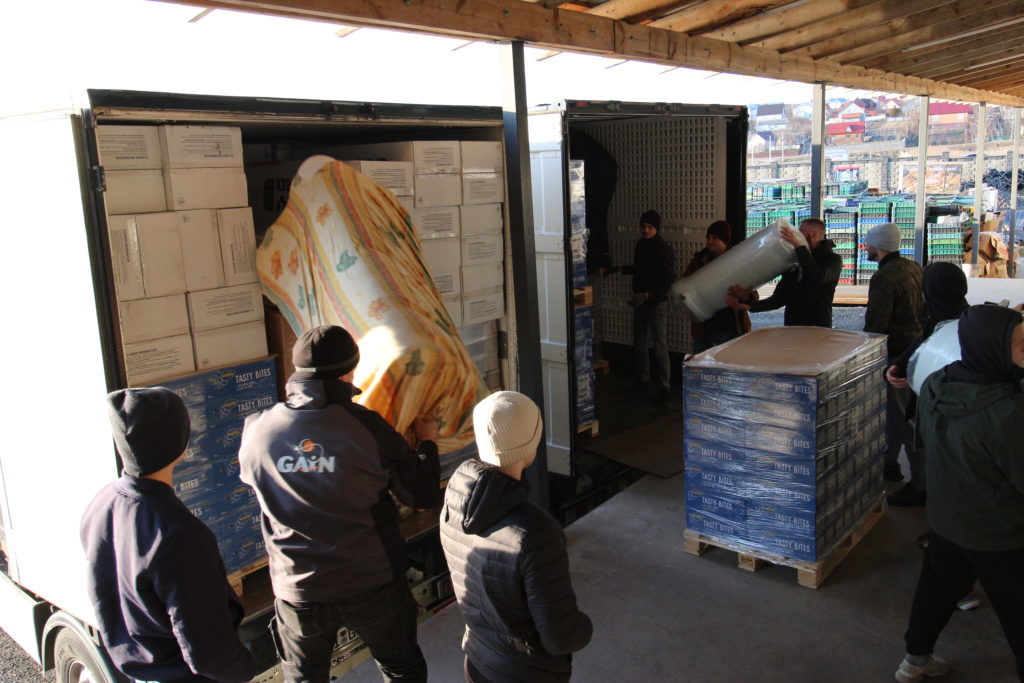
We arrived later than expected, but we are finally here. The entry to the warehouse is a tricky one, but our experienced GAiN drivers could manage it even with their eyes closed. In front of us, there is a group of about 20 to 30 people, most of them young men, volunteers from our local partner within Ukraine. Tomorrow, a fleet of cars and vans will come here from different parts of the country to bring GAiN’s aid to the hardest-hit areas of war.
These are the real heroes of war. People arriving from war-torn cities and towns under the eye of fire and shellings, just to go back and deliver basic supplies to their neighbours. We cannot feel any other way than privileged to be a small part of what they are doing by helping and enabling them to alleviate so much suffering taking place right now and here.
“Right after the war began, four or five days later, these were the first guys who took the minibuses, the food from their salaries, simple food, all they could, and they were the first ones, they did not wait for anybody,” says Sasha, our local partners’ main contact. He is surrounded by other two Sashas (formally Alexander). All three of them are the main people responsible for coordinating the efforts being done to deliver aid to the different regions and to accommodate families moving to the border.
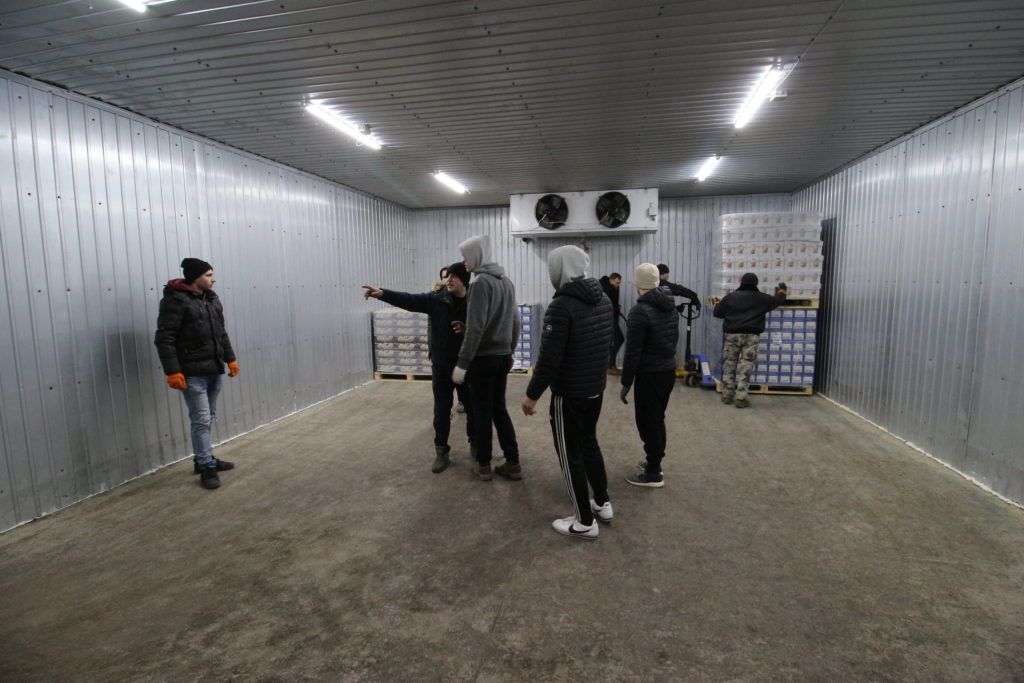
Sasha comes from Vishgorod, north of Kyiv. Today, his church and many other villagers from Vishgorod were able to evacuate. “Kyiv is still working good because there is still an open side where they can bring in the food,” he explains. “Those cities that are surrounded are in a more difficult situation.”
Sasha is happy that we could enter the country and meet them personally: “Western Ukraine became the hub for receiving the aid and send it. Here it is safe, this road is safe. I wouldn’t send you anywhere further, but here is safe.”
Sasha is driving more around the country, but who is really taking care of the warehouse we are now is the other Sasha by his side. “In the evening this is full,” he says. “But tomorrow there will be nothing here. Many buses, light trucks and even bigger ones, we are loading them here and sending them to Kyiv, Kharkiv, Poltava…”
Their network of churches is present in the 24 provinces in Ukraine. “As soon as we get something,” he continues, “we arrange the transportation and take it to the person who is responsible for the area.” The first Sasha takes over this point of the conversation: “Here in the phone there is a group with 25 church leaders and tonight,” he points to the second Sasha, “This man will see the specifications and will say to the 24 leaders: guys, we have this and that… So, already tonight or in the morning these guys will know what you have brought here.”
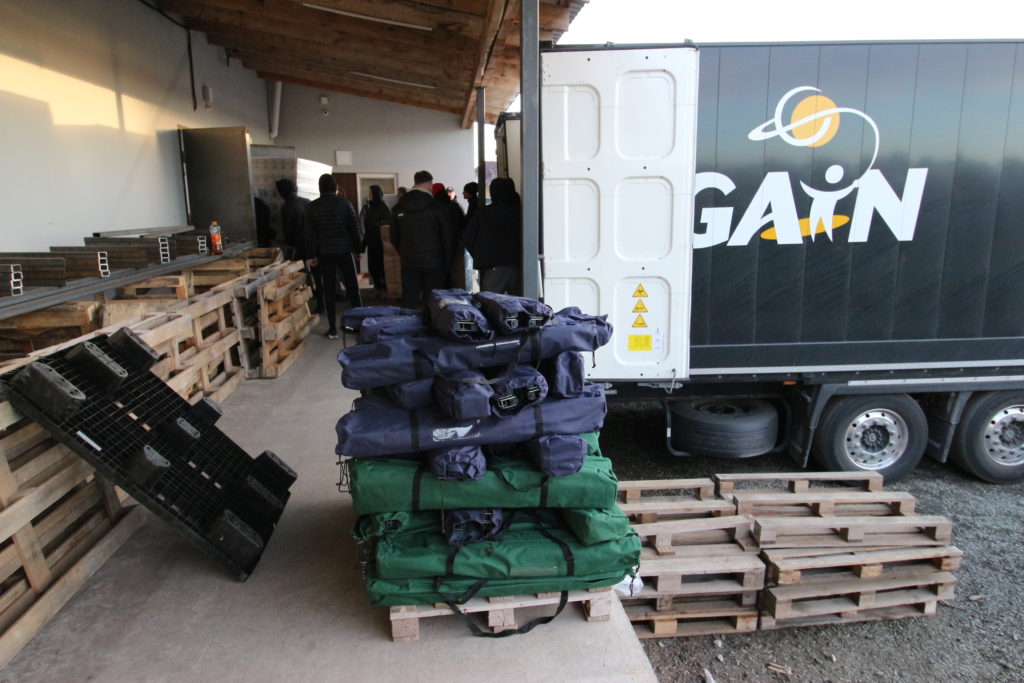
He keeps on going: “A lot of people now they evacuated from their homes, they have no basic things… So, I want to say thank you for giving the people the very basic, supporting them at the neediest moments in their lives.”
Finally, we ask the other Sasha, as the main leader of the network of churches that we partner with, how the Ukrainian Church is enduring this time of suffering. Sasha’s response cannot be any more hopeful: “I made a statement today that the war removes religion and brings faith. This region was one of the biggest church-wise, and some of us were concerned that we were living a lot of times locked in our own worlds, but now our walls have fallen. Our young people are just going around serving people, and that’s incredible.”
Story by Pau A.
It’s six in the morning. We spent the night in a convent in Przemyśl (Poland), fourteen kilometers from the border. We headed to the giant Tesco supermarket which, thanks to the recent closure of all its branches in Poland, now serve as reception halls for refugees across the country. We have two trucks parked there, one of them with a double trailer, loaded with gasoline for more than 1,000 kilometers and full of pallets with new mattresses, food and hygiene products.
Once at the border, it seems that we coincide with the changing of the guard. Have to wait. They ask us for papers. Have to wait. They ask us for passports. Have to wait. They ask us for papers again. Have to wait. And the scene is repeated at Ukrainian customs. In total, we have lost five hours and one of the colleagues who left her passport at home.
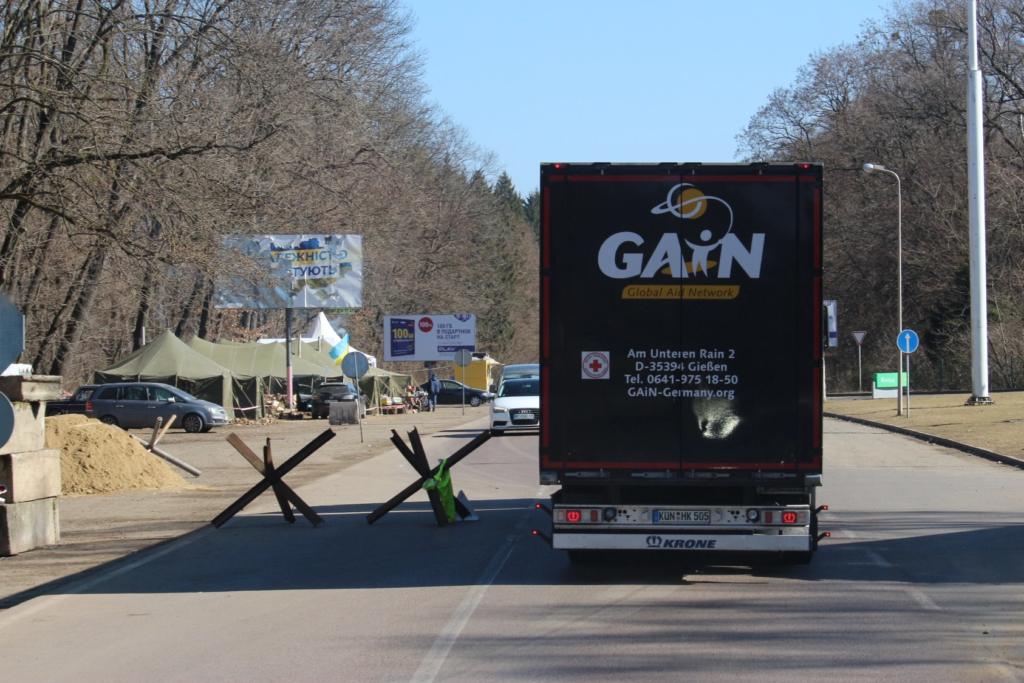
Last night was the first in which Russia attacked Western positions. Specifically, at the Lutsk and Ivano-Frankivsk airfields. At the border itself, while we wait for our passports, we join a group of carriers. I talked to two of them. They are from Ivano-Frankivsk and are going to stay. They carry water. Eyes stopped, frozen, as if moving the iris inside, searching through thoughts for answers to a war they don’t understand.
We are in Ukraine. After passing the queue of buses and refugees entering on foot, the streets become empty and inhospitable. Later we will find more traffic, more life, but here in the villages of Shehyni and Volytsya there seems to be no one left. Also, the road is terribly potholed. Although that is not the reason for the bumps, it is the feeling of entering a country at war from minute one.
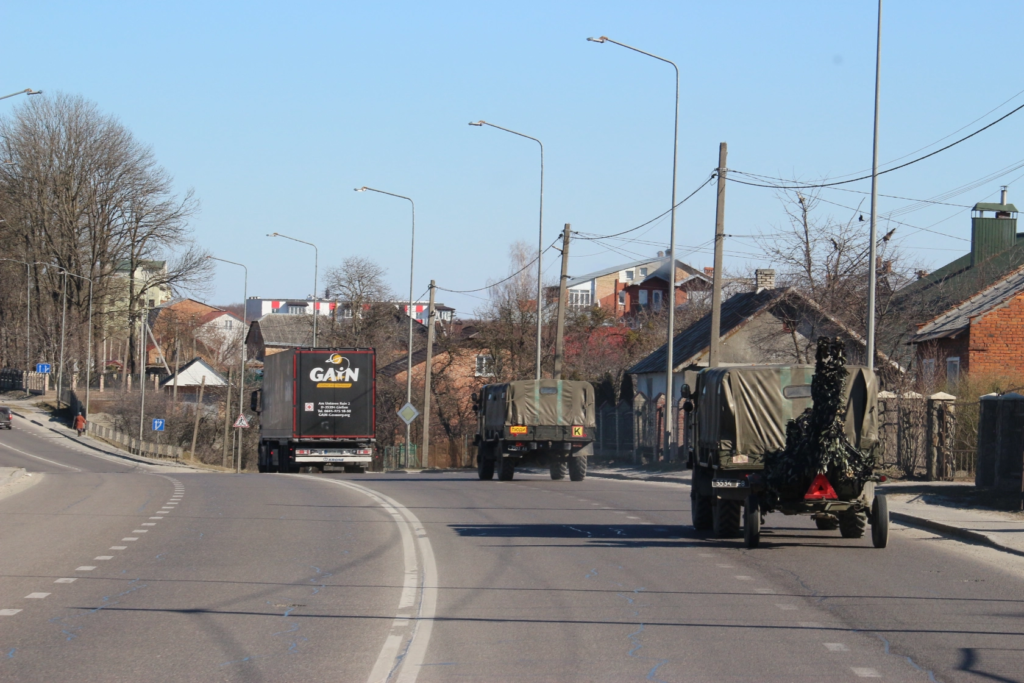
A few kilometers after Lviv we see a serious traffic accident that must have happened just a few seconds ago. If I had been in the truck in front I would not have missed it. It is not the only crashed car that we will see. It will be the nerves, or the rush, or the crossfire to which their minds are subjecting themselves.
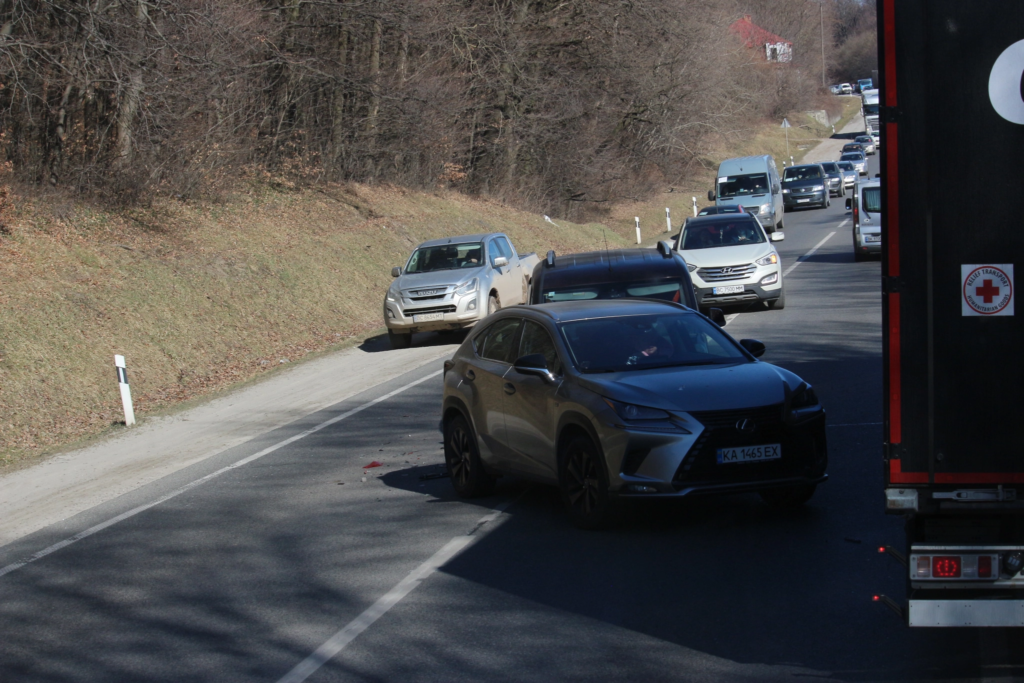
The checkpoints are not as many as I expected and in all of them they let us pass without asking when we see the humanitarian aid icon on our windshield, although by mistake it says “Ralief” instead of “Relief”, which, in reality, gives it a touch more local and folksy. To the right and left, all road exits are barricaded. Although the number of cars heading to Poland is clearly higher, there are also vehicles heading to kyiv. Perhaps the so-called twenty-four-hour ceasefire declared by Russia from eight in the morning has an influence.
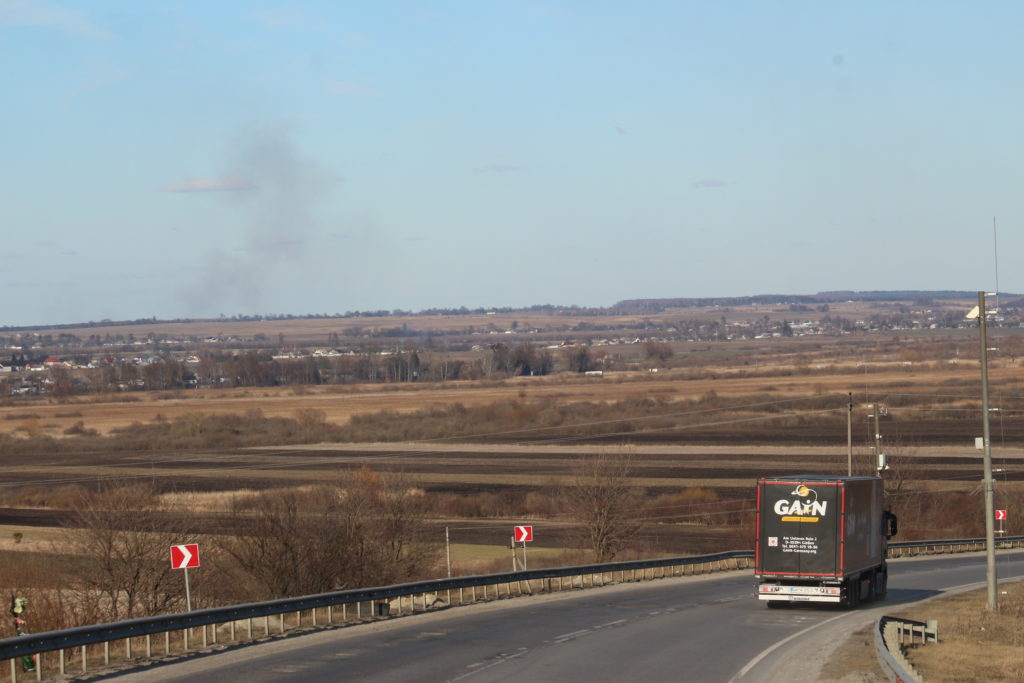
It’s after five in the afternoon. After more than five hours of driving, we reach our destination in Rivne: a warehouse that has been rented by a network of Protestant churches to bring aid to the places most affected by the war and still accessible. There, three dozen young people are waiting for us to unload the aid. Among the young people I find oddities like Andrei, 37, a Ukrainian emigrant who has come with his wife and small children from the US to help his compatriots. “I prayed to God and inside I felt that I wanted to help, I didn’t want to stay in the United States watching what was happening,” he tells me.
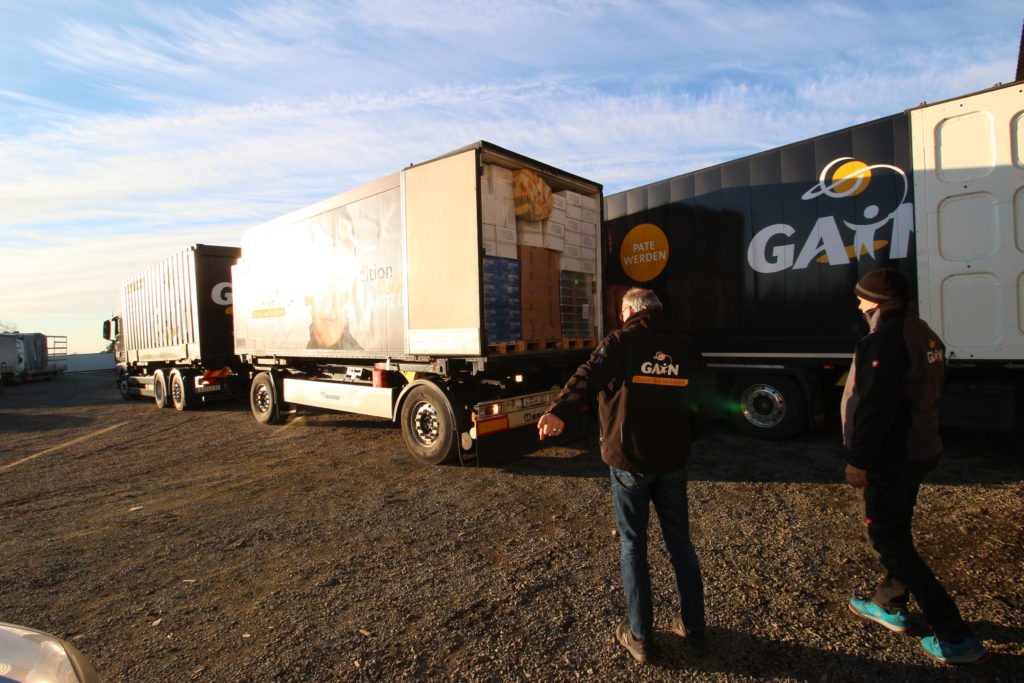
Then they take us to the church that has been converted into a makeshift shelter for individuals and families passing through Poland. As we eat dinner, one of the officers looks at me with wide eyes and utters the words, “It’s like living in a nightmare.” After dinner, while the rest do paperwork and paperwork, I meet Artem, a 19-year-old who has arrived with his grandparents. He lived with them in kyiv because he was starting his studies at the kyiv Polytechnic Institute. His parents and little sister live in Kherson and right now it is impossible for them to flee.
We are late. It’s after seven and curfew starts at ten. We shot out. At every turn I think the trailer will roll over and drag us down. We crossed more checkpoints. In one of them they catch me taking a photo. They make me go down. I erase the photos in front of them and they happily send me off. Viktor, the driver, already grumpy, gets angry. Then he won’t stop calling me “Paparazzi”.
At one of the last checkpoints, a soldier notices the Ukrainian colors and the “Ralief Support” on our windshield. He bids us farewell with his hand on his heart and bows in sincere gratitude.
We finally reached the border. It’s eleven at night. Cars, vans and buses pile up. Volunteers from World Central Kitchen go from vehicle to vehicle announcing that we can come by to pick up food while we wait. I accept the offer, but before I find the place, a colleague from the truck in front brings me bread and sausages. A few moments ago we had joked on the radio about ordering some pizzas at the border, anticipating that we were going to take a long time to leave. We are not wrong. We will end up watching the sunrise from the border.
After three in the morning, I approach the services between the Polish and Ukrainian customs. A group of refugees has gotten off one of the buses. I see mostly women and children. The last of all, a few steps away from his mother, a boy about eight years old is crying.
I immediately see in his expression that this boy is not crying because he complained or because his sister stole his toy or tablet. Nor does he cry because his mother has punished him. At that moment I discovered that there are tears and tears. This child cries in fear. Cries of frustration. He cries helplessly for not knowing or understanding what is happening. He cries of pure rage because he has had to live what no child should live.
Story by Pau A.
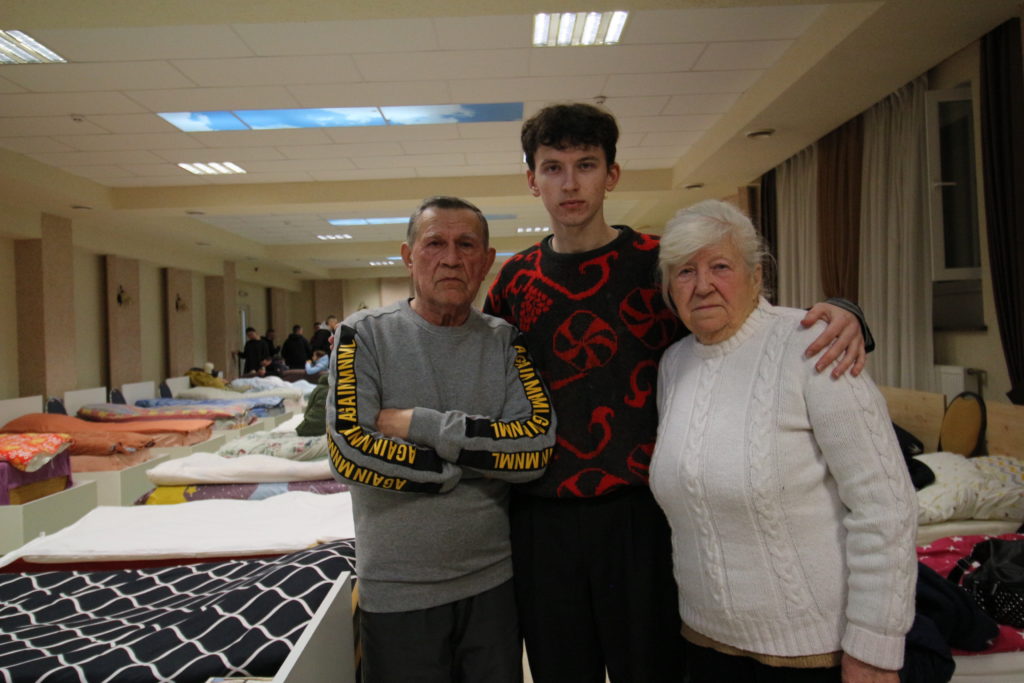
We arrive at the church in Rivne. The sun is going down, but just a little over thirty beds within the big worship hall are already occupied.
One of the pastors tells us the place will be full by midnight. People are still on the run. They usually arrive by 7pm or 8pm, and surely before the 10pm curfew. The next morning, all will be empty again, families will get back on track towards the border, and the church will get ready to host the next group.
Among the few guests who arrived earlier than usual is Artem and his grandparents. He is 19 years old. They were living in Hostomel, one of the towns in Kyiv’s outskirts that is being fought day after day by the Russian army, coveted especially because of its aerodrome.
“We left Hostomel two days ago,” Artem recounts. “Our country evacuated us because in Hostomel there is a lot of bombing and fire, so they evacuated us to Kyiv, and from Kyiv we came here with a bus.”
Artem was living with his grandparents because he was studying for a degree at Kyiv Polytechnic Institute. “Now our study is stopped, we pray that we can continue to study.” Fortunately, he still managed to escape with his grandparents, but unfortunately not his parents and sister. They are living in Kherson. “This is where the war is hitting very bad,” he explains. “We want to evacuate them too.”
That will not be easy as Kherson is one of the cities hardest hit by the war from day one. “We speak with them by phone, messages, Viber, [and] Telegram. They cry because of us, because of our situation, but they feel better for us now [since we could be evacuated]. We pray that they will be good.”
The look in his eyes, as with most of the Ukrainians we met so far, spoke on his behalf before he even pronounced any words. “It’s hard to understand,” he paused. “My friends, my family… We are under big stress. We don’t feel good, but we stay positive.”
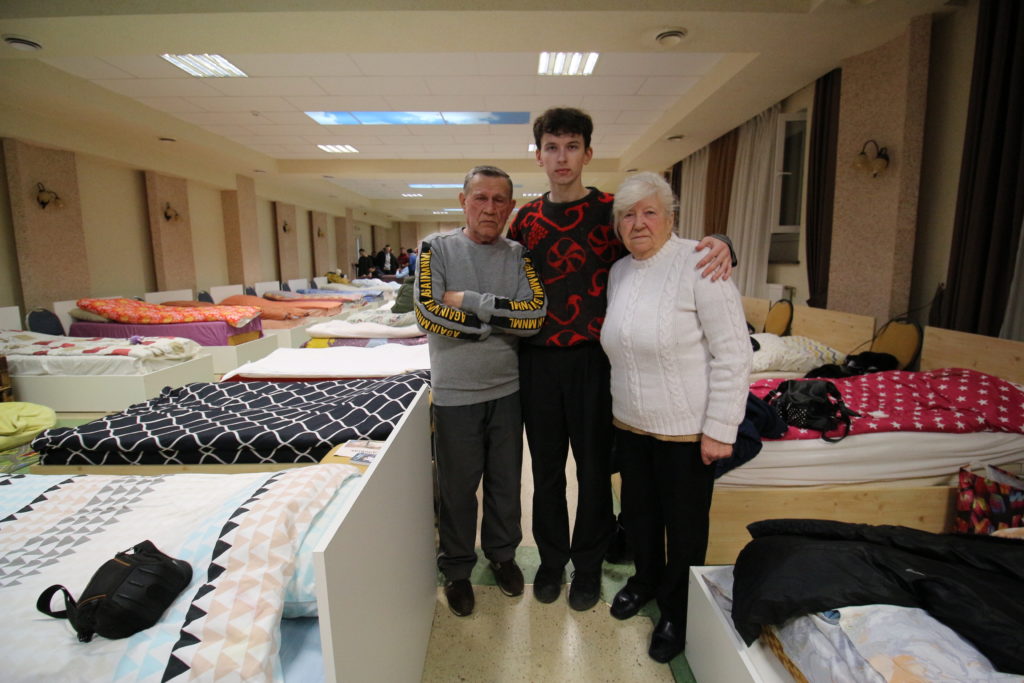
Tomorrow will be another long day for Artem. They plan to arrive in another city closer to the border, and from there maybe to Poland. But for now, probably the most urgent need for him is to stop thinking about tomorrow, at least for a little while. “We just need to sleep now, eat some food, have some fun because we have a lot of stress.”
As soon as Artem’s grandfather finds out we are here to help them, he leans in slightly – an honest sign of gratitude. I tell them this is the least we could do. After I pray for them, we wave goodbye and I wish them all the best, especially thinking of Artem’s parents and sister. We still have a long drive back to Poland ahead of us, but they have a much longer drive back to hope, joy, goals, dreams, and peace of heart.
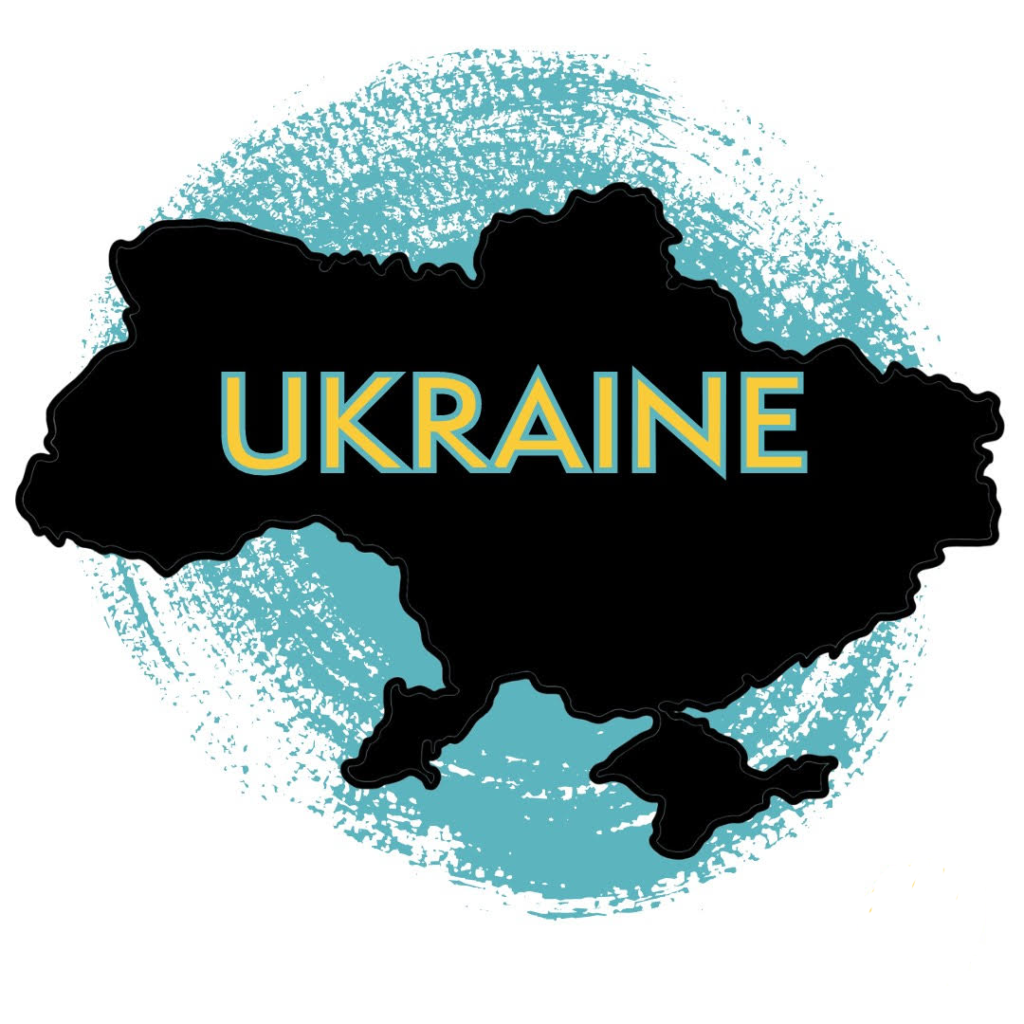
“The missile hit. Everything was on fire. I heard gunshots. It had hit my neighbours. Blood everywhere. You won’t find an answer. There is no answer. There is nothing left.” – Igor* described what he witnessed.
UN aid agencies estimate that millions of people could be displaced following the Russian invasion of Ukraine on February 24, 2022. 6.5 million people have been displaced within the country, and over 3.6 million people who have left the country urgently fleeing to neighbouring countries as they seek safety.
The terrifying sound of air raid sirens blaring throughout Kyiv, and images of locals taking shelter in underground places like subway stations, only show a glimpse of the horrific reality that many families and individuals are currently experiencing.
Many who have already left the country – mostly women and children – have been forced to separate from their husbands, fathers and brothers, as men aged 18-60 have been restricted from leaving the country for possible conscription.
“There are no winners in war, but countless lives will be torn apart.”– Filippo Grandi, head of UN refugee agency UNHCR.
There is great fear and uncertainty for the Ukrainian people. Those who have left everything behind to flee to other countries for safety are in dire need of essentials.
Will you join us as we work to provide emergency relief Ukrainians who are displaced?
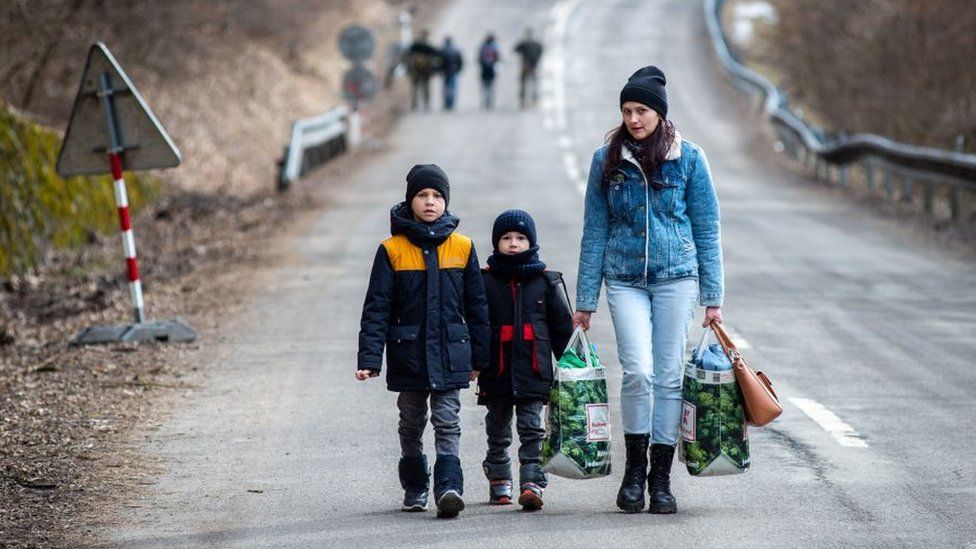
Global Aid Network (GAiN), through its offices in Germany and the Netherlands are packing and procuring essential items such as food, medicines, tents, sleeping bags and blankets to ship to their local frontline partners. These much-needed items will be provided to refugees arriving in Poland, Hungary, Romania and the Republic of Moldova.
Refugees are desperately in need of hope, peace, provision and protection. The need for aid is critical. As of April 1st, we have sent 82 shipments via truck. As the number of people affected continues to rapidly increase daily in this complex situation, we continue to help even more people during this critical time and are committed to supporting people in this time of desperation.

“The missile hit. Everything was on fire. I heard gunshots. It had hit my neighbours. Blood everywhere. You won’t find an answer. There is no answer. There is nothing left.” – Igor* described what he witnessed.
UN aid agencies estimate that millions of people could be displaced following the Russian invasion of Ukraine on February 24, 2022. 6.5 million people have been displaced within the country, and over 3.6 million people who have left the country urgently fleeing to neighbouring countries as they seek safety.
The terrifying sound of air raid sirens blaring throughout Kyiv, and images of locals taking shelter in underground places like subway stations, only show a glimpse of the horrific reality that many families and individuals are currently experiencing.
Many who have already left the country – mostly women and children – have been forced to separate from their husbands, fathers and brothers, as men aged 18-60 have been restricted from leaving the country for possible conscription.
“There are no winners in war, but countless lives will be torn apart.”– Filippo Grandi, head of UN refugee agency UNHCR.
There is great fear and uncertainty for the Ukrainian people. Those who have left everything behind to flee to other countries for safety are in dire need of essentials.
Will you join us as we work to provide emergency relief to those who are displaced?

Global Aid Network (GAiN), through its offices in Germany and the Netherlands are packing and procuring essential items such as food, medicines, tents, sleeping bags and blankets to ship to their local frontline partners. These much-needed items will be provided to refugees arriving in Poland, Hungary, Romania and the Republic of Moldova.
Refugees are desperately in need of hope, peace, provision and protection. The need for aid is critical. As of April 1st, we have sent 82 shipments via truck. As the number of people affected continues to rapidly increase daily in this complex situation, we continue to help even more people during this critical time and are committed to supporting people in this time of desperation.

Kaiden* is a high school student. He lives with his family and regularly attends church meetings. His family is very poor and as the oldest son, he is working to help take care of them. Every summer, Kaiden works to help his family save money for the school year. His job is essential to him being able to continue his education.
The pressure and burden of having to help support the family is a lot for a high school student. When Kaiden heard that Global Aid Network (GAiN)’s partner, a local church in Damascus, provides Bags of Blessings (bags that contain food and non-food items for a family of five), he went to attend and ended up meeting Jesus. Today, Kaiden is growing steadily in his relationship with Christ.
GAiN has been involved in Syria since 2013, and has been working steadily with our local partner for eight years. Since then, tens of thousands of Bags of Blessings have been distributed and the gospel has been presented to 16,763 people – resulting in 5,992 people who have made the life-changing decision to follow Christ.
The Bags have helped to alleviate some of the burdens that Kaiden has had to carry for his family. With the provision of food and other items in the bag, Kaiden can put some more money toward his education and future.
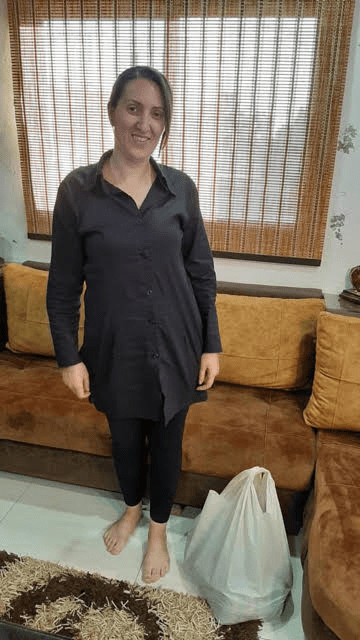
Sahar* understands the daily struggle Kaiden lives with. She, too, had to overcome many obstacles in her life, including her father losing his job in 2016. Sahar has a brother with physical disabilities and has to work to provide food for the family. Currently, all of her salary goes toward rent for their apartment.
In 2018, Sahar’s father sadly passed away and they had no money for a funeral. When God provided the money from a church that had heard about her situation, Sahar then started to really think about Christ. When Sahar was invited to the church in 2020, she attended with caution. Brother Salih*, from the church, spoke with her and encouraged her to depend on God, who can provide for her needs. At the time, Sahar’s suffering had been so great over the years that she didn’t believe it would happen. Although she told Brother Salih that she believed and accepted what he was saying, in her heart, she didn’t feel it to be true.
After a few days, Salih and his wife visited Sahar. There, they had the chance to share the gospel with her, in which she accepted Christ as her saviour, through tears of joy. She also received a Bag of Blessing and was surprised that God knew exactly what her needs were. He had provided for her at the right time, considering she had nothing to eat that day.
Today, Sahar is a strong believer and shares the gospel with others, and attends a discipleship group.
Kaiden and Sahar are just two of the tens of thousands of people whose lives have been touched in some way since the start of the Bags of Blessings program, thereby revealing hope and restoring life to the people of Syria.
*Name has been changed for security purposes.
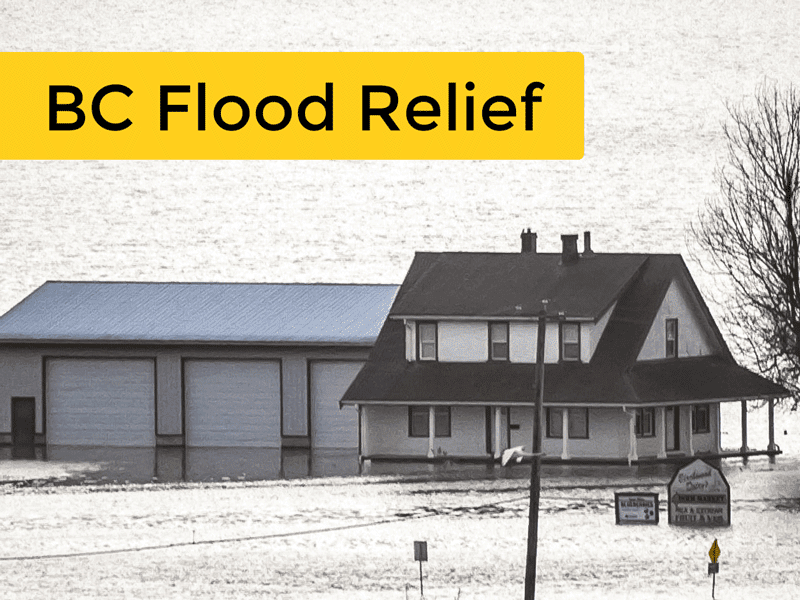
On November 17, the BC government declared a state of emergency due to widespread flooding across the province. Tens of thousands of people have had to evacuate, leaving behind their homes, businesses and entire livelihoods.
The effects of the flooding hit close to home as parts of the Lower Mainland region (Abbotsford, Mission, Chilliwack, Hope), where many of our staff and partners live, have been significantly impacted.
“The Fraser Valley flooding has impacted our immediate family, friends and the greater farming community. We have observed first-hand the tragic loss that many families have experienced. However, the strength and resilience in this community is like no other; selfless in their dedication to help each other.” Ben & Ashley VanDorp
Nathan and Shena Gorter share: “Our hearts are broken as we check in with our friends and church community, who are affected by rising waters in Sumas Prairie. There are tremendous heroic efforts taking place by farmers, first responders, volunteers, churches, and friends to save people and livestock and provide essentials for living. People are exhausted physically and emotionally and we continue to pray and turn our eyes towards Jesus to gain strength as efforts continue hour to hour.”
Please join us in prayer for:
- Safety and peace for families, individuals that have evacuated and vulnerable populations
- Safety for first responders and those working hard to clear the roads and manage the community water systems
- That the damage to homes and properties would be minimal and that livestock would be able to be moved to a safe location
- The infrastructure that it would continue to hold, and there would be no more challenges introduced into the already complex situation
We are partnering with Samaritan’s Purse, which is in charge of the evacuee shelter in Abbotsford. Together we will provide aid and support to evacuees who have been impacted by the floods. Will you join us* in demonstrating God’s love through compassionate action to those who are suffering?
